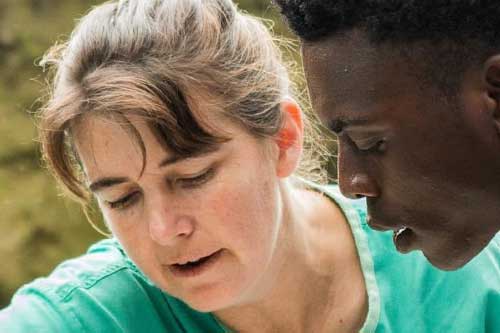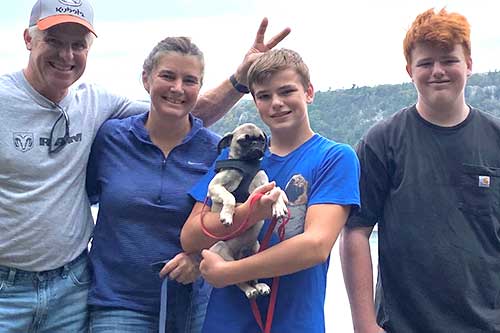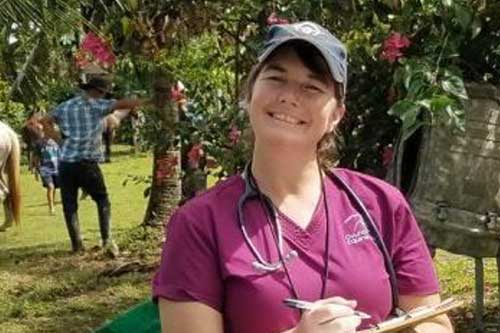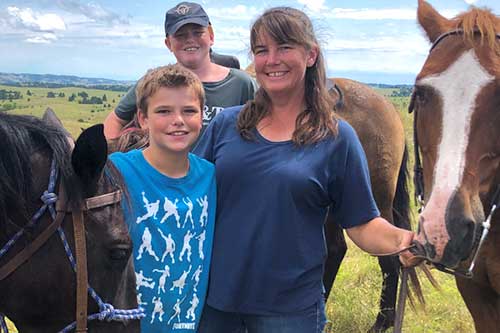Judy Batker

Equine veterinarian Judy Batker, DVM, successfully owns and operates a busy veterinary practice and is also the President of the Equitarian Initiative, a non-profit organization. Judy’s passion for veterinary medicine was reinvigorated after getting involved with the Equitarian Initiative, and she now successfully works with working equine veterinary programs in Haiti, Costa Rica, and the Pine Ridge reservation in North Dakota. The mother of two teenage sons, Judy has found balance and fulfillment in running a business, having a family, and leading a non-profit organization. She credits strong mentorship and watching other female veterinarians start families as part of what has helped her along the way. From Wisconsin, Judy originally saw herself being a traditional farm veterinarian and only got involved in international veterinary work 15 years after graduating from veterinary school! We were inspired and impressed by Judy’s dedication to her clients, her equine patients, her community, and her family, and sincerely appreciated her thoughtful reflections on finding balance as an equine practitioner and advice to veterinarians just starting out.
Veterinary School & Year Graduated: University of Wisconsin, Madison, 1995
Questions and Answers
- Tell me about your most challenging and rewarding veterinary jobs or work experiences.
- Technically I've only had two jobs. I've worked at two different clinics in the same community. My first job out of vet school was very important because it really helped me realize that I wanted to do equine medicine. It was challenging because one of my two employers had very different ethics than me and handled cases very differently. That was challenging, but it also showed me early on what kind of professional I wanted to be. The other employer was a saint. Right away, I saw what I liked and what I didn't like. That was really good for me to have that stark contrast, but also challenging because it was hard to practice the way I wanted to. The good employer and I eventually became partners and that’s how I got my second job. We built a brand new clinic and had to grow it from nothing, especially in terms of growing the small animal side. It was financially very challenging and we struggled to make ends meet. Eventually we grew, especially the small animal portion. It was tricky trying to be an equine practitioner and manage 30 staff, but it was also rewarding and I learned a lot about business and people. It has also been incredibly rewarding to work in the same community for 25 years. I know the people so well. I've known some of them for all 25 years and I've seen their children grow up and I’ve seen horses from beginning to end. I really like that long term relationship with people, knowing their whole family and knowing their dog's name. I like coming on to their farm and being part of their life. The other part of my career is Equitarian Initiative work. I’ve been doing that for 10 years and it’s extremely rewarding. Working with them saved me from burnout and brought me back to loving veterinary medicine again.
- What did you love about the position or experience?
- I was 15 years into practice at the 2009 AAEP conference when I first heard about Equitarian Initiative. I was really burned out and I had two young children at home. I was so inspired by the Equitarian work. I had been searching for that feeling of really making a difference not only in the lives of animals, but in people’s lives as well. My clients love their horses and need them for mental health and physical health, but they don't necessarily need them to survive. I felt like something was missing in my career. I wasn’t getting the satisfaction that I wanted and I was tired of the demands from others that didn’t seem important in life. I was so excited and inspired by the possibility of working on that level! These people, families, and communities depend entirely on their working horse or donkey. They're so hungry for knowledge and knowing more about their animals and I love that I can provide that.
- Tell me about your journey to get to that point in your life.
- I went to my first Equitarian workshop in 2010, which is also the first time I left the country. I didn't care that I was going alone to Mexico, I was just so excited to join this group. It was a great experience and I met some of my important mentors that continued to this day at that first workshop. Everybody else at the workshop flew out early on the last day except Dave Turoff and I - we had late flights. We walked around Veracruz, Mexico together for hours and I asked him a million questions. He has a wealth of information and 20 years of experience working internationally.
My path has involved meeting the right people and things falling into place. I happened to meet a vet student who had just come back from Haiti and was excited about it. I had just returned from Costa Rica for the first time and we were comparing stories.Through her, I made [the necessary] connections that allowed me to get my project started in Haiti. I've always been in the right place at the right time or met the right person when I need to. These encounters have launched me to the next step and I have been able to continue my journey. Right now I'm deeply involved with the Equitarian Initiative and have a project in Pine Ridge, South Dakota, as well as in Haiti.
I've been able to balance this all with my practice life largely because I am the practice owner. I know other people who struggle to balance it when they're not the practice owner or if they don't have full support from the practice owner. It was also good in a way that I was 15 years into practice, too, because I was more financially set. It has always been a struggle for young veterinarians to go on these trips from a financial standpoint. I now manage this balance of work, life, and traveling for international volunteer work.
One of my problems early on was getting frustrated with my clients’ complaints after coming back from these trips. They would complain about little bumps or scrapes and I had a hard time being patient. I wanted to keep doing Equitarian work, but it was making me not like coming back to work. I happened to be working in Haiti and I was working with Rudy Kirkhope, a veterinarian from England who now works in Arizona. He has done a lot of international work and he and I were chatting about this. He finally explained to me that when we travel, we don't judge the impoverished people, so why should I go home and judge the non-impoverished people. We all only know what we know. The people with a lot of means don't know how to live differently, or don't even know different lives exist. It was a simple thought, but it really helped me. That was three years ago. Over that time, I've worked through it and I'm in a really great place. I love my clients again and I enjoy their problems, but equally love leaving and helping with other problems abroad.
To elaborate more on the projects I am involved with, I got started with the Pine Ridge Reservation after joining a group that was in their third year of providing veterinary medical care for the reservation. I brought Equitarian Initiative into the project, but it already existed. 2021 would have been the 12th year but we weren’t able to make it due to travel restrictions. We go there for a week and provide vaccines, deworming, castration, and wound care. It's grown over time, but right now we take 12 veterinary students with us, mostly from Wisconsin. We have eight core vets that work with us and five of those eight are young vets who first came as students and have continued on. It’s really great and fun to watch them develop from a student to a leader. We work in four groups and try to have a farrier with us as well. We travel around the reservation to large workspaces where people can ride in but we also visit homes and treat horses there. We've been treating about 400-600 horses per week. In 2018 and 2019 we created a four-day community college course through Oglala Lakota College consisting of lectures and hands-on labs. We have a class of around 20 people and we teach everything ranging from anatomy to nutrition and wound care and suturing. A lot of the residents have to suture their own horses because most of them aren’t able to see a veterinarian when their horse gets injured due to lack of funding and availability. They’ve done a great job with caring for wounds and performing their own farrier work. We weren’t able to go as a group this year, but my family went out and we delivered dewormer, vaccines, and wound supplies. Some of the graduates from our four-day course distributed the supplies and performed some of the preventive measures that we would have done. It’s great that they have those skills now and can provide for their community.
My work in Haiti started with a community in Milot. Milot is a town with a rich history and is home to a large citadel used to defend against the French. Currently, the citadel is a tourist site. They have very small horses, about 500 pounds, that carry tourists up the mountain to see the citadel. Some of the horses are still used to take people to the market and children to school. We started working with this community because the horses were important to them. On our first visit, they knew the horses weren't healthy and they were concerned about that. We've also created a vet agent team because there are so few clinical vets in Haiti. The agents may have had a little training with a vet, they may have picked it up on their own, or they may have had extensive training. The team has grown to three women and 11 men and we have only lost one person from the original team which is great to see. I go twice a year and there is another veterinarian who now lives in Haiti and is there year-round. Since then, she and I have partnered - the Equitarian Initiative provides the funding and supplies and she provides the cultural knowledge, language support, and transportation. It’s a great partnership! We’ve educated the vet agents on topics like nutrition, saddle sores treatment, and preventive health care. We work in different communities and the vet agents have gotten to the point where they do the majority of work and I have a supervisory role. They are the ones educating their fellow Haitians. Between political unrest and COVID, I haven't been there for a year and a half. They’ve become very self-sufficient and the team has continued traveling to communities together and providing care for animals. We started with just taking care of horses for the first couple of years, but then we realized that the vet agents need to learn all species, especially food animals, to make some money. They now have their own paper receipts, give records to the owners, and have a logo. It's been very exciting to see them come together and form this association. - As a veterinary student, did you ever imagine yourself taking this journey and having these professional experiences?
- No. I don't know about these types of opportunities while I was in vet school or if they even existed. I knew our farm vet who turned out to be my first boss and eventual business partner. I just planned on being a farm vet and didn't really know much outside of that. I hadn’t traveled internationally and I didn't know much about veterinary medicine in other parts of the world. Looking back, I always wanted to do international development work but I was in a rush to finish veterinary school and start working. Similarly, I studied wildlife biology in college and I always had an interest in conservation. I see caring for working equines as an integral part of conservation. I ended up circling back to my original interest even though I hadn’t planned it that way at all.
- In retrospect, what do you wish you’d known as a veterinary student or early in your career?
- I wish there had been more opportunities for international work. I think that has improved, although it's still limited, especially in the large animal and equine worlds. I also wish I hadn’t been in such a rush to get through veterinary school. I wish I took the time while I was young and not a mother to travel and seek out alternative branches of veterinary medicine. I was very focused on traditional clinical medicine and I wish I took time to explore other options.
- Would you have changed anything about your time in veterinary school?
- I worked during every break and felt like I had to make as much money as I could. Although that was valuable, I would have taken more time to travel during the breaks, both in undergrad and vet school. I have made so many international connections just by traveling, talking with people, and listening to their stories. I wish I had taken the time to make those connections earlier instead of trying to make a little money which didn't make a difference in the long run.
- Would you have changed anything about your time since graduating veterinary school?
- I wouldn’t have changed anything, but I would love to see international working equid work as a viable career path. Most of the people doing this right now are volunteers and have to juggle working full time and funding their own trips. I would love the opportunity to do this as a full time job. I hope that in the future there is more funding available and more opportunities for people to do it either full time or part time. I have been lucky to be my own boss and fundraise money for my projects from my clients at home. I hosted fundraisers, shared my plans, and got people excited about helping working equines internationally. When I go to their houses [on vet calls] I give them updates and they love being a part of the story and knowing exactly where their money is going. We also have some local trainers who have donated their time holding clinics and raised money for us. It’s a community project, not just mine, and that's really been fun to see grow over the years. My clients also donate tack every year to take to Pine Ridge. This work has provided my community with an outlet for giving while simultaneously providing essential goods to the Pine Ridge community that they otherwise couldn’t afford.
- Did you have any mentors or role models along the way that helped or inspired you? Please provide an example of how they helped you or what qualities they had that made them a good mentor? How did you find them?
- I've been very fortunate to have many great mentors. Larry Mahr was my original farm vet when I was a kid. He became my first employer and my first practice partner. He was an example of everything good that a vet should be. One of the things that he taught me the most was to not take things personally from clients. He would tell me that when they’re upset, it’s because of some aspect of their life and you really can't take it personally. It was a really good example for me to see, especially as a young vet. There was a vet I worked with when I was a student and she was only a few years older than me. She was a great example of starting her own practice as a young pregnant woman. I saw that you could be pregnant and have children and start your own practice.
I also consider all of my Equitarian Initiative colleagues and a lot of the community members as mentors. It has been amazing to see what residents in Pine Ridge and in Haiti have been able to accomplish for their community. There are also inspiring and motivating people that I have met at AAEP conferences and I've continued to stay in touch with. Eric Davis from UC Davis is another person that I consider to be a mentor. He's done this type of work for so long and we share a love of working on reservations. A lot of my mentors are not necessarily somebody I directly worked with, but rather people that I worked with here and there and talked to and they say something valuable that pops into my mind often. I have met almost all of my mentors through my schooling, on international trips, and at AAEP conferences. - Tell me about any pivotal moments or key turning points that shaped your career.
- Early on after starting my practice, one of our partners was not helping the practice and was a very negative influence. I went to a practice management seminar through AAEP and went to a roundtable discussion. I discussed the partner that we were struggling with and everybody around me agreed that I needed to end his employment. It was pivotal because I was in denial about the situation and needed to hear it from other people to act on it. It was a hard and challenging thing to do, but very important for growing a healthy business. First hearing about international equine work was also a key turning point. It changed the course of my practice as well as my mental status and feelings of burnout. Had I not found an outlet, I would have been less happy with what I do and not a great mentor to veterinary students. Now I am able to mentor veterinary students and share opportunities to volunteer with them.
The other pivotal moment in my career was three years ago when we became an equine only practice. That was a huge positive step because it simplified my life and made life-work balance even more possible. Another moment that comes to mind is when I was a young veterinarian working for a man who I did not enjoy as a boss. They renewed my contract and my hard work and contributions were not reflected in that contract. It was insulting. He told me that since I was married to a local farmer, I was stuck in this area. I did not accept the new contact and told them I was leaving. The other boss came to me and said that he would walk with me and we became practice partners. Standing up for myself and refusing to be stuck in that situation was very pivotal and very difficult, but it all worked out. - Tell me about one or two challenges, setbacks or obstacles that you faced along the way on your professional journey. How did you address those?
- One of my challenges was realizing that I could be successful and build a practice without working nonstop. That was a challenge because that was all I had known and it was difficult to make the transition into a healthier work-life balance. Another challenge has been managing conflict between staff. I am able to forget and handle client conflict much more easily than staff conflict. [We had a situation where] I really enjoyed everyone on an individual basis, but people weren’t working well together. I would facilitate face to face meetings between staff and I even had a consultant team come out to help us. Eventually, a few vets left and the clinic became a more positive environment.
- What was the most important lesson you learned as a veterinarian, and still remember today, and would want to tell vet students about.
- Do not settle for okay. Find the place where you feel great. Trust your instincts and don’t work somewhere where you have to adapt to a situation that isn't true to you and what you need. Looking at the character and ethics of your future employer is the most important thing. How they live their life will most likely be reflected in how they run their clinic. Try to work with like-minded people as much as possible. The other thing is to not to be afraid to stand up for yourself. Often, young veterinarians get taken advantage of and feel like there is a risk of losing their job if they do stand up for themselves. It is more likely that they will be respected for it and strengthen their position.
- What’s been the biggest highlight of your career so far?
- I have so many great memories and I can't imagine being anything but a veterinarian. I love being outside and talking about horses all day long. I don't have individual moments, I just truly enjoy going to work every day. Some of the biggest highlights come from my experience teaching students, especially on trips to Haiti and Pine Ridge. It’s so important to minimize harm and try to create a sustainable solution on these trips and teaching skills rather than doing everything ourselves is a really important part of that. It’s also great to see the students I bring gain cultural insights and realize how important horses are in other parts of the world. I love seeing that and most of them are so committed to trying to continue to volunteer or do similar work in the future.
- Is there anything else you’d like to tell me that you think would be helpful or relevant to veterinary students or early career veterinarians?
- I want to stress how important it is for young veterinarians to find mentors to bounce ideas off of and have a sounding board. Finding one or more of these people is crucial to their well-being and satisfaction within the profession. It’s so important to hear that you are not the first veterinarian to make a mistake or make a client mad. I think it’s also important to have mentors out of the field that you can talk to and remind you that the world doesn’t revolve around veterinary medicine. It can be a tough and emotionally involved profession, but having a balance of people in your life can make a huge difference.



